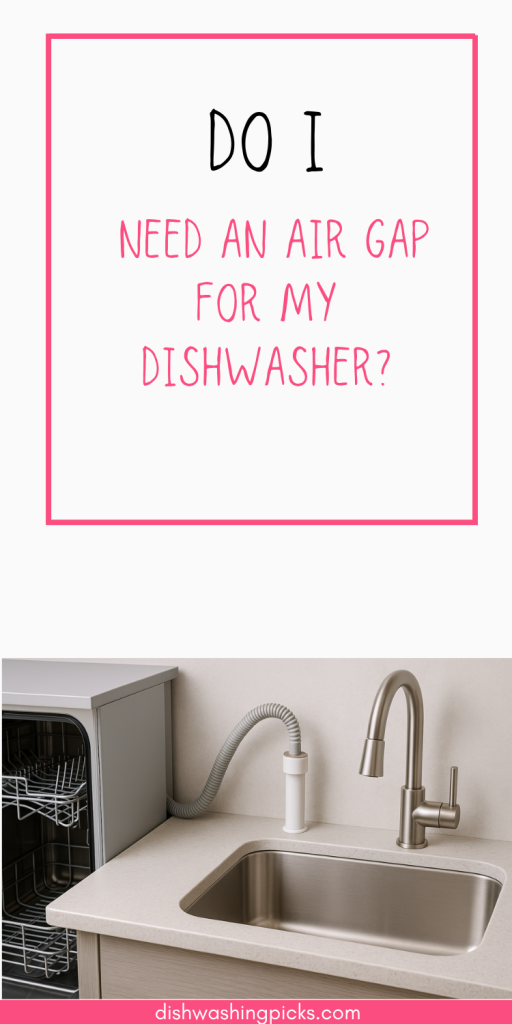
Okay, let’s talk about this weird little metal thing next to your kitchen faucet…
You know the one. It’s small, kinda useless-looking, and honestly? Most people don’t even notice it’s there until someone asks: “Hey, what’s that thing?”
That, my friend, is an air gap. And if you’re here, you’re probably wondering: “Do I actually need one for my dishwasher?” Great question. Grab a snack and let’s break it down — no plumbing degree required.
First things first — what is an air gap, really?
Let’s imagine this: You’re draining your dirty dishwater — full of old spaghetti sauce, coffee sludge, and mysterious food bits. That nasty water flows from your dishwasher and (ideally) into the drain.
Now… imagine there’s a clog in your kitchen sink. Water backs up. And guess what? Without an air gap, there’s a chance that gross water could flow back into your dishwasher. Yeah. That same machine that’s supposed to clean your dishes.
Yuck.
So, the air gap acts like a bouncer at the club. It keeps that dirty water from ever coming back in. It literally creates a space (a “gap” — see what they did there?) between where the clean water goes out and where the dirty water could come in.
Do I legally need an air gap?
Ah, the classic “do I have to or can I get away without it?” dilemma.
The answer? It depends on where you live.
- Some states (like California)? It’s required by code. No air gap = no pass on your inspection.
- Other places might be more chill about it. They might allow something called a “high loop” (we’ll get to that in a second) instead.
If you’re doing a kitchen remodel or getting a permit for a new dishwasher, definitely check your local plumbing code. Don’t worry — it’s not as scary as it sounds. A quick call to your city’s building department and you’ll know what’s up.
Okay but… do I actually need one?
Here’s where it gets real.
If you want to be super safe and avoid any possibility of your dishwasher becoming a swampy backflow disaster… yes, get one.
That said, if your area doesn’t require it by code, and your installer uses a proper high loop, you might be fine.
But let’s be honest: Dishwashers aren’t cheap. Repairs definitely aren’t fun. And having gross sink water shoot back into your dishwasher? Absolutely not the vibe.
So for peace of mind? The air gap wins.
What if my sink doesn’t have that weird air gap thing?
Totally normal. A lot of older or DIY installs skip it.
Instead, some setups use the “high loop” method. That’s when the dishwasher drain hose loops up under the countertop before dropping back down to the drain or garbage disposal.
The idea is that water can’t backflow upward into the dishwasher because of gravity. And in most cases, it works just fine. But again, it’s not quite as foolproof as a real-deal air gap.
If your dishwasher was installed without one and everything’s been working great? You don’t necessarily have to panic. But if you’re installing a new one — or upgrading your kitchen — it’s worth doing right.
So, how do I get one?
Good news: air gaps are cheap. Like, under $20 at your local hardware store cheap.
They come in different finishes to match your faucet (because yes, even plumbing gets a glow-up these days). You can install one yourself if you’re handy, but if not, a plumber can knock it out in no time.
Just make sure the dishwasher hose is properly connected to it and the drain line is secure — that’s the real trick to making it work.
Final Thoughts (a.k.a. the TL;DR moment)
Do you need an air gap?
- If your local code says yes: you do. No getting around it.
- If your code is more relaxed: you probably should, but a high loop may be okay.
- If you want to be on the safe side and protect your dishwasher (and your dinner plates) from nasty backflow: absolutely yes.
It’s one of those “small thing now, big headache later” situations.
So next time someone points at your faucet and asks, “What’s that little thing?”
You can proudly say: “Oh, that? That’s my dishwasher air gap. Total lifesaver.”
And hey, you’ll totally sound like a kitchen genius.
